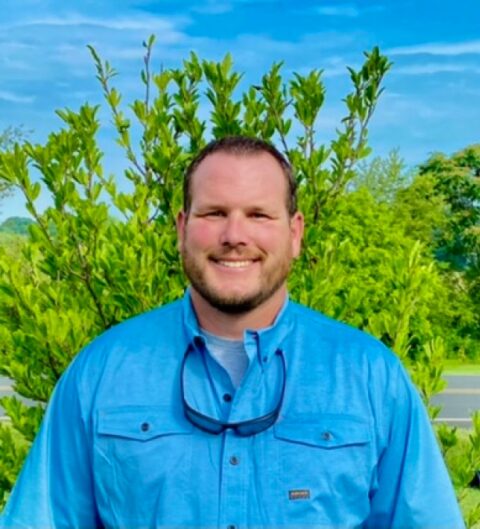“My program affects students’ lives even more than they can realize now; sometimes information and skills are stored and only used later on when necessary. Students learn skills and knowledge that they will not receive anywhere else in their educational experience through my class. Seeing a product to completion with a sense of pride and satisfaction being one of them. They learn the value of working hard, taking pride in their work, attention to detail, and what quality is acceptable in the market.”
Joshua Bowles has taught carpentry for thirteen years – the last ten at Alexander Central High School in Taylorsville, North Carolina. Bowles found his passion for helping others in high school, where he was moved by his teachers’ dedication and helped other students in his agricultural mechanics classes. Bowles received a full-ride North Carolina Teaching Fellows Scholarship to North Carolina State University for Agricultural Education and taught agricultural mechanics at Orange High School after taking over for his beloved and dedicated mentor teacher. When the carpentry instructor position opened at his alma mater, he moved back to his home county to take the job and marry his future wife.
Bowles’s curriculum in carpentry initially focuses on residential construction, and prepares students to launch a career in construction, or in other related fields, such as architecture, masonry, electrical, plumbing, concrete finishing, insulation installation, and more. His more advanced classes focus largely on commercial construction and techniques that are specific to the commercial industry, giving students the skills they need to pursue a career at commercial construction companies.
Bowles’s students enter a learning culture that is both academic and hands-on with an emphasis on high expectations, repetition, and perfection. He runs the class as close to a residential construction site as possible and all students are expected to participate with high professional standards. Bowles’ students start with introductory birdhouses and move into creating Adirondack benches, picnic tables, doghouses, storage buildings and homes. Students can hone their skills over several years on Bowles’s student-built job site, where his classes construct an entire home for Habitat for Humanity. From framing the floor system, walls, front and back decks, stairs, and handrails to installing vinyl siding, doors, laminate flooring, and locks, from hanging drywall to perfecting trim, his students do everything. They have completed twelve different Habitat for Humanity homes.
Bowles wrote in his application, “The problems that students must solve are not contrived by me or put forth as hypotheticals but are natural to the building process. Problems naturally arise as students build, especially on the jobsite and because of their experience levels. I tend to try and let students attempt to solve their own problem first and then guide them in the right direction after some small failures. Failure is a much better teacher sometimes than success.”
Bowles connects his students to experiences beyond high school, inviting local industry professionals and community college representatives to come speak to his students about furthering their skills. He also places students in a summer apprenticeship program in the trades through the local community college. In this program, students are paired with a local employer in their area and they work for them Tuesday – Friday (with Monday as a class day.) Bowles’ students also showcase their skills locally at the North Carolina pre-apprenticeship contest and a local county construction rodeo, and also through their local SkillsUSA chapter. They compete at the SkillsUSA regional competition, state competition, and this year at the national level in carpentry.
Bowles works to continuously improve his teaching by constantly modifying and evaluating his curriculum. Four years ago, he obtained his certification from the National Board for Professional Teaching Standards.
“Skilled trades teachers develop a rapport with students that other teachers do not have the opportunity to do. In other classrooms teachers are primarily teaching to the class at large. As a skilled trade teacher, we work alongside students in one on one or smaller group situations in the shop, at Habitat for Humanity, student built house projects, etc. You get to know the student better and can therefore individually tailor learning.”
